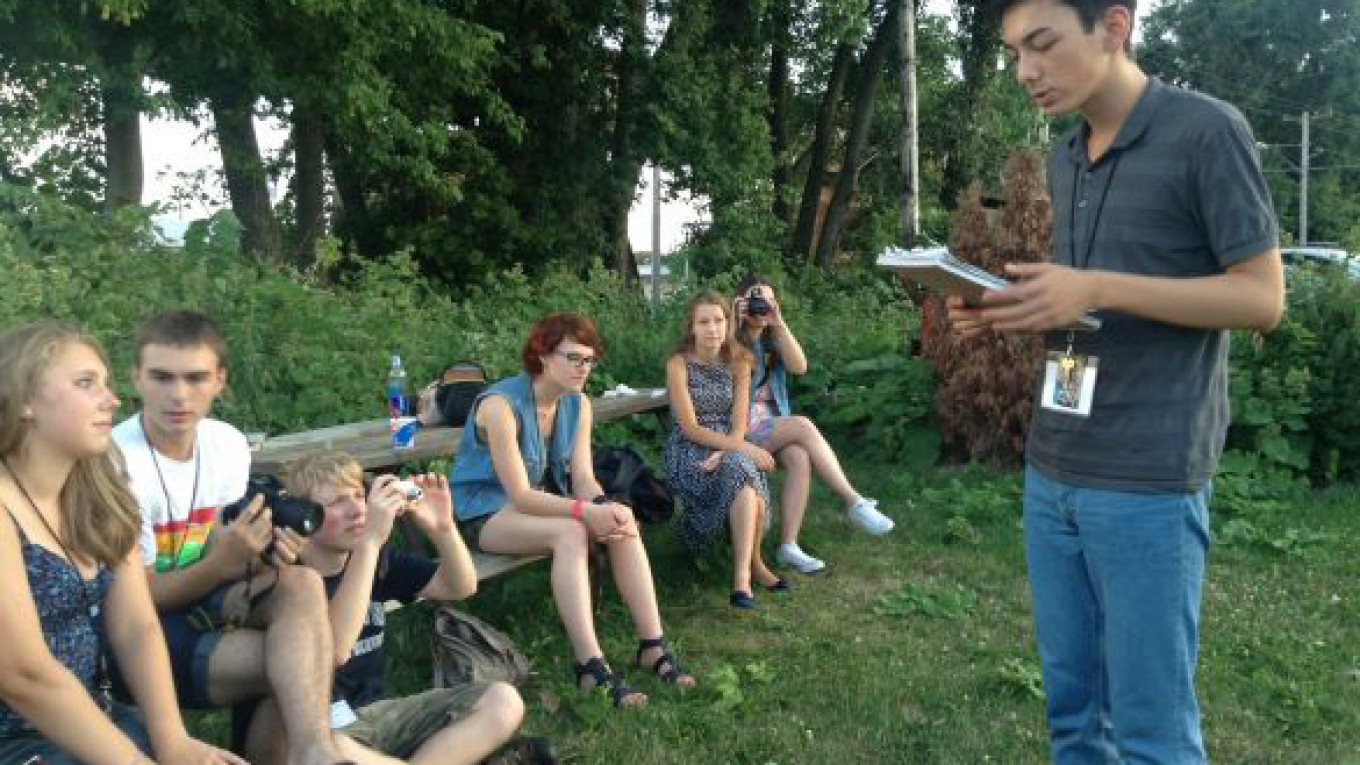Russian teenagers have been spending two weeks learning the craft of writing at one of America's best literary arts institutions.
Mikhail Zaharov, a 16-year-old from Smolensk, thought his English was near perfect when he went to the U.S. for the first time this July to participate in a creative writing program called "Between the Lines." He had been studying English "relentlessly" for 10 years and began to write plays and screenplays a few years ago after the Paul Thomas Anderson film "Magnolia" inspired him to become a film director.
"I tried to order a hamburger, which seemed really easy and not challenging at all," Zaharov told The Moscow Times of his first time putting his English to the test. "But when the employee started speaking I was shocked. I suddenly realized that I couldn't understand a word of what he was saying."
In the short span of two weeks, however, Zaharov's eyes and ears tuned in to his new surroundings, and his exploration of language went far deeper than the subtleties of ordering lunch.
The principle goal of Between the Lines, a program sponsored by the Bureau of Cultural and Educational Affairs at the U.S. State Department that brings young writers from across the globe to participate in a two-week long writing camp at the University of Iowa, is to promote cultural exchange through creative writing. Having just finished its sixth summer session, last year was the first to include Russian participants. That program was both the largest and most diverse in the program's history: 44 students participated, including 10 from Russia, 22 from across the U.S. and 12 from 10 Arab countries in the Middle East and Northern Africa.
The program is unique in that it does not focus on American culture and literature, or on improving foreign participants' English skills, "but rather to explore what it means to be a writer in one's own literary tradition and to learn from other's literature," program coordinator Kelly Morse said.
"Literature can reveal the heart of a people's culture in a way that can't be replicated anywhere else, not even in movies, because reading requires active participation on the part of the reader," Morse said.
Beginning with the Middle Eastern countries, where creative writing is generally not taught in schools despite the ancient tradition of Arabic poetry, Russia's rich literary culture made it a natural next choice.
"The University of Iowa's prestigious Writers' Workshop and the Gorky Institute of World Literature were founded within four years of each other in the 1930s. So for the BTL Russian program, it is more a case of two literary traditions meeting and exchanging ideas with one another."
This year, interest on both the American and Russian sides sharply increased from the previous year. Out of more than 40 applicants from an already self-selecting group of Russians ages 16 to 19 who had to submit work in English and Russian to be considered, 10 were chosen for the all-expenses paid opportunity to travel to the U.S. and spend two weeks focusing on nothing but writing.
Each morning, both English and Russian participants joined in a two-hour seminar in English, this year with American poet Kiki Petrosino. For the second half of the day, they took part in creative workshops held in their native language. Russian students worked with the award-winning novelist Alan Cherchesov, a writer-in-residence at the Iowa Writers Workshop. In addition to working on poetry and fiction in both languages, the participants also had the opportunity to attend guest lectures on playwriting, contemporary Russian poetry and the international novel.
Cherchesov, who visited Iowa in 2008 as part of the delegation of Russian writers participating in an Open Society Foundation program, as well as a 2010 writer-in-residence at IWP, was invited by the University of Iowa's International Writers Program director Christopher Merrill to participate in the BTL program.
"It's a unique chance to understand oneself better, and both the country that invited you and the one you represent," Cherchesov said. "The famous American saying about the fish that only understands what water is when it's taken out of it is more fitting than anything else."
"The results of two weeks of work for the young program participants will extend, I believe, to a much longer period. Possibly for their whole lives. They will henceforth look at the world through different eyes, because their inner world has become markedly different."
It's also, Cherchesov commented, not by chance that the quality of the students' work had improved noticeably by the end of their session at Iowa.
"The U.S. and Russian participants lived, ate, and attended classes together, so they created strong bonds and could talk about writing at any moment," Morse said.
Zaharov said one of the most moving moments of the trip was when Russian and American participants united in a khorovod, an ancient Slavic ritual of joining in a circle of dance and song, at an organic farm near Iowa City. "We're all humans after all, I thought, with flaws and strengths, and there is so much beauty in this paradox," he said, reflecting on that moment. "We were not supposed to be there — Putin's policy obviously says no to the collaboration — and yet here we are, like there's nothing wrong, like there have never been any disputes, like we've never been enemies."
During the course of the two weeks, the students also maintained a blog with lively posts and pictures documenting their experiences, which outside of the writing workshop included a visit to the Washington County Fair, a public reading at local literary landmark The Haunted Bookshop, a Washington, D.C. poetry slam and a linguistic exchange led by the Russian faction.
"I have a new appreciation for the skills of the Russian BTL students — the transition from English to Russian and vice versa is by no means an easy one," wrote Isabella Jibilian from Connecticut. "We learned basic conversational phrases, struggled over the Cyrillic alphabet, and enjoyed watching our peers act as pigs, cows and sheep while we yelled out the animals' names in Russian. We even got a taste of Russian culture, by singing 'Kalinka' and dancing the 'Rucheyok.'"
Nineteen-year-old Inna Dmitriyeva from Petrozavodsk first started writing in English a year ago, though she had been writing in Russian since the age of eight: Her first poem was dedicated to her mother on the 8th of March. She heard about BTL when Merrill gave a visiting lecturer at the St. Petersburg University of Humanities and Social Sciences, where she is a student.
It wasn't Dmitriyeva's first time abroad, but it was her first trip to the U.S.
"We were very lucky to meet talented and interesting people and work with them, to see a lot of beautiful places, to understand what cross-culture communication is."
Pieces written by each student in Iowa were collected in a final anthology.
"Draw away from this silence / River flows in an unknown way / If the sky's length / You may do it / You may," Dmitriyeva wrote in one of her poems.
Dmitriyeva said she was not sure if creative writing would become a career.
"I hope so. But anyway, it's my passion, something that is always with me and in me. This is the most important thing," she said.
Contact the author at [email protected]
A Message from The Moscow Times:
Dear readers,
We are facing unprecedented challenges. Russia's Prosecutor General's Office has designated The Moscow Times as an "undesirable" organization, criminalizing our work and putting our staff at risk of prosecution. This follows our earlier unjust labeling as a "foreign agent."
These actions are direct attempts to silence independent journalism in Russia. The authorities claim our work "discredits the decisions of the Russian leadership." We see things differently: we strive to provide accurate, unbiased reporting on Russia.
We, the journalists of The Moscow Times, refuse to be silenced. But to continue our work, we need your help.
Your support, no matter how small, makes a world of difference. If you can, please support us monthly starting from just $2. It's quick to set up, and every contribution makes a significant impact.
By supporting The Moscow Times, you're defending open, independent journalism in the face of repression. Thank you for standing with us.
Remind me later.






